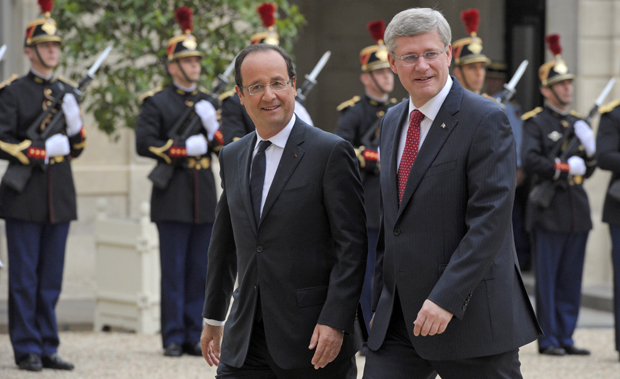Steven Chase, Paul Waldie
Canadian trade negotiators are running up against bureaucratic infighting among European Union officials, who are backing away from earlier commitments in talks for a Canada-EU trade deal – increasing the chances Stephen Harper will return home empty-handed after a week-long trip to the region.
Negotiations between Canada and the 27-member EU have entered their fourth straight week in Brussels. They are part of a push by Canada to conclude negotiations on its biggest trade deal since the historic Canada-U.S. free-trade agreement of 1988 – one that would make it easier for Canadian companies to sell goods and services to 500 million consumers in the EU.
he Prime Minister’s Office has tried to play down expectations for Mr. Harper’s seven-day trip, slated to end June 18 after a Group of Eight meeting in Northern Ireland. But the Conservatives had hoped for a deal during the visit because it would give Mr. Harper a win while he’s under fire at home for a Senate expenses scandal.
Sources familiar with the talks say in more than one instance Canadians felt they’d locked down agreement with the Europeans on a topic, only to see that consensus unravel because directorates in the EU bureaucracy hadn’t signed off on the terms. They say this has happened in negotiations over trade in services, slowing the momentum of the talks, which have already been under way for four years.
“The EU side seems increasingly incapable of getting its act together to close a deal,” one Canadian source said. “The various competing directorates within the EU are fighting each other, which is leading to erratic moves such as backing away from earlier commitments – actions that are on the verge of bad faith. The EU has to demonstrate it’s serious about cutting a deal.”
Officials with the EU delegation in Ottawa were not immediately available to comment.
Friction in negotiations comes as a bigger trade fish looms for the European Union: the United States. Leaders of both countries at the G8 meetings in Northern Ireland Monday said they plan to start EU-U.S. trade agreement talks next month – a development that threatens to overshadow Canada’s negotiations with Brussels.
“We’re talking about what could be the biggest bilateral trade deal in history,” British Prime Minister David Cameron said at the G8 meeting at the Lough Erne resort in Northern Ireland. “A deal that will have a greater impact than all the other trade deals on the table put together.”
Canadian officials at the G8 played down Monday’s announcement of the start of EU trade talks with the U.S. “I wouldn’t say there’s a concern there,” a senior government official told reporters Monday. “We’re down to the final rounds of discussions and it’s always difficult at the end.”
Canadian government officials have repeatedly argued in private that the EU also has something to lose from not securing a trade deal with Canada before talks with the U.S. begin. Canadian officials say the EU needs to demonstrate to Washington that it’s serious about making the concessions necessary to sign an ambitious trade liberalization accord.
Speaking Monday, U.S. President Barack Obama said a U.S.-EU deal will boost trade between both sides, which already totals roughly $1-trillion annually and accounts for 13 million jobs. “The U.S.-EU relationship is the largest in the world,” Mr. Obama said. “This potentially groundbreaking partnership will deepen those ties.”
The EU-U.S. negotiations will begin in July in Washington, and the European Union hopes to have a deal done within a couple of years. “We intend to move forward fast,” said Jose Manuel Barroso, president of the European Commission which conducts the negotiations on behalf of the EU. “We intend to make rapid progress.”
Canada has been negotiating a trade deal with the EU for four years, and Canadian officials had hoped to sign an agreement before the EU began negotiations with the U.S.
But if anything the trip has illustrated how far away a deal seems. During Mr. Harper’s visit to Paris last week, French President François Hollande said he hoped the Canadian deal could be completed in the coming months.
Mr. Harper has insisted that Canada will not set a deadline for the talks.
“Canada has made robust offers in good faith. Canadians expect to be provided the same by the EU. We continue to make this clear to our EU counterparts,” said Adam Taylor, director of communications for International Trade Minister Ed Fast. “We will only sign a deal that advances Canada’s priorities. It remains our hope that we will soon achieve an agreement with the EU.”
In recent days, the federal government has agreed to make it easier for European Union companies to acquire Canadian businesses. Sources last week told The Globe and Mail Canada has consented to raising the minimum threshold for scrutinizing foreign takeovers by EU companies to $1.5-billion. Deals below that level would not require government consent to proceed.
This would appear to give the European Union an edge on other parts of the world if the 27-member union and Canada reach a trade deal.
Canada has also agreed to grant EU firms greater access to bidding on procurement for provincial utilities as well as improved access to sheltered sectors such as telecommunications, according to sources close to the talks.
Canada-EU trade deal threatened by infighting






































Laissez un commentaire Votre adresse courriel ne sera pas publiée.
Veuillez vous connecter afin de laisser un commentaire.
Aucun commentaire trouvé